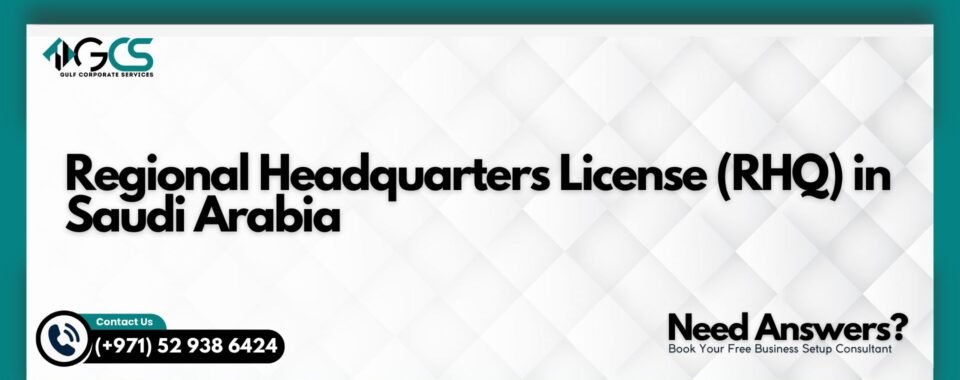
The Regional Headquarters License (RHQ) in Saudi Arabia has become one of the most strategic gateways for multinational companies seeking to expand their operations in the Middle East. Introduced under Saudi Arabia’s Vision 2030 reforms, the RHQ program encourages global corporations to establish their regional management offices in Riyadh. It allows companies to consolidate decision-making, oversee regional subsidiaries, and access government incentives. For foreign investors, the RHQ license offers not just market entry but also an opportunity to align with the Kingdom’s ambitious economic transformation. This guide explores everything you need to know about the RHQ license, from eligibility requirements and benefits to compliance rules and practical steps for obtaining one.
What is a Regional Headquarters License in Saudi Arabia?
The Regional Headquarters License (RHQ) is a special business license introduced by the Ministry of Investment Saudi Arabia (MISA) and the Royal Commission for Riyadh City (RCRC). Its purpose is to attract multinational companies to set up their central management offices in Riyadh. Unlike a standard commercial license, the RHQ license focuses on management functions rather than commercial sales. Companies with RHQs are expected to coordinate strategy, planning, budgeting, and other key decisions for their regional branches. This initiative strengthens Saudi Arabia’s role as a business hub, ensuring international corporations use the Kingdom as their base for Middle East and North Africa operations.
Why Saudi Arabia Introduced RHQ License
Saudi Arabia launched the RHQ program to compete with regional hubs like Dubai and Doha. The Kingdom wants global firms to treat Riyadh as their main headquarters for the MENA region. By centralizing decision-making within Saudi Arabia, the government can boost job creation, attract foreign direct investment (FDI), and enhance its global competitiveness. For companies, it presents a chance to access a growing economy, favorable policies, and tax incentives while building a strong base in one of the region’s largest markets.
Benefits of Regional Headquarters License in Saudi Arabia
Obtaining an RHQ license in Saudi Arabia comes with multiple advantages for foreign investors. The program offers exemptions, incentives, and operational benefits that make it easier for multinational corporations to establish long-term presence in the Kingdom.
Tax Benefits and Incentives
RHQ-licensed companies enjoy favorable tax incentives. These include corporate tax relief, exemptions on withholding tax for certain activities, and reduced liabilities on cross-border services. The RHQ model ensures that businesses save significantly compared to traditional licensing structures. By basing operations in Saudi Arabia, companies can also take advantage of double taxation agreements with other countries, enhancing financial efficiency.
Visa and Employment Privileges
The RHQ license allows companies to issue unlimited work visas for executives, specialists, and employees. Unlike other business licenses that restrict visas, RHQs are designed to house regional management teams. This makes it easier for corporations to relocate skilled professionals to Saudi Arabia. Moreover, RHQs are exempt from strict Saudization quotas, giving firms flexibility in hiring the right talent from around the world.
Access to Saudi Government Contracts
One of the most important benefits of the RHQ license is eligibility for Saudi government contracts. From 2024 onward, only companies with an RHQ in Saudi Arabia are allowed to bid for certain government tenders. This policy pushes multinational companies to establish RHQs in Riyadh if they want to maintain or expand their market share in the Kingdom’s public sector.
Eligibility Criteria for RHQ License
Before applying for an RHQ license, multinational companies must ensure they meet the eligibility requirements set by the Ministry of Investment (MISA). These criteria are designed to attract genuine global corporations rather than shell companies.
Minimum Global Presence Requirements
To qualify for an RHQ license, the applicant must be a multinational corporation with presence in at least three countries and two regions. The company should already operate through subsidiaries, branches, or affiliates in those locations. This requirement ensures that only established firms with significant regional operations qualify for RHQ benefits.
Nature of Activities Permitted
RHQ licenses are issued for management and support functions rather than direct commercial sales. This includes strategic planning, finance, marketing, HR, legal services, and IT support for regional subsidiaries. While RHQs cannot engage in profit-generating trade, they can oversee, supervise, and guide subsidiaries. Companies that want to sell products in Saudi Arabia will require a separate commercial license alongside the RHQ license.
Financial and Compliance Conditions
Applicants must demonstrate strong financial health with audited statements from the past fiscal years. They must also commit to compliance with Saudi regulations including labor laws, tax obligations, and reporting standards. Ensuring transparent governance and long-term commitment to Saudi Arabia is key to RHQ approval.
Functions of an RHQ in Saudi Arabia
Unlike commercial branches, an RHQ operates as a management hub rather than a trading entity. Companies that establish RHQs in Riyadh must perform specific functions to maintain compliance.
Strategic and Operational Supervision
An RHQ is expected to supervise and guide the activities of regional subsidiaries. This includes setting business strategies, aligning financial goals, and ensuring operations meet corporate standards. RHQs function as the decision-making center for all Middle East operations.
Administrative and Support Services
Another critical function of an RHQ is providing support services such as human resources, legal compliance, IT, and financial planning. By consolidating administrative functions in Riyadh, companies reduce costs and improve efficiency across their regional branches.
Knowledge Transfer and Training
RHQs also serve as centers of excellence for knowledge transfer, training, and innovation. They are expected to build local talent by investing in training programs, upskilling Saudi employees, and creating sustainable knowledge-sharing frameworks. This aligns with Vision 2030’s focus on human capital development.
Step-by-Step Process to Obtain an RHQ License
Securing an RHQ license requires careful preparation and submission of documents through MISA. The process is structured to ensure only serious multinational firms qualify.
Step 1: Initial Application
Companies must file an application with MISA outlining their global presence, intended RHQ activities, and commitment to Saudi Arabia. The application should include corporate details, ownership structures, and subsidiary information.
Step 2: Submission of Documents
Applicants must provide audited financial statements, incorporation certificates, and a detailed business plan. The plan should explain how the RHQ will support subsidiaries and contribute to the Saudi economy. Proper documentation is crucial for approval.
Step 3: Licensing and Registration
Once MISA approves the application, the company receives the Regional Headquarters License. The RHQ must then be registered with the Saudi Chamber of Commerce and other authorities as required. This completes the formal licensing process.
Step 4: Post-Licensing Compliance
After approval, companies must begin operations in Riyadh and fulfill compliance obligations. This includes annual reporting, employee hiring, and ensuring the RHQ performs designated activities. Failure to comply may result in penalties or license revocation.
Costs Associated with RHQ License
Understanding the financial obligations linked with an RHQ license is crucial for planning.
Licensing Fees
MISA charges application and licensing fees that vary depending on the company’s size and scope. These fees cover the evaluation of documents, legal processing, and administrative support.
Operational Costs
Apart from licensing, companies must budget for office rental in Riyadh, employee salaries, and professional services such as legal and accounting support. The government encourages companies to invest in modern headquarters that reflect their global stature.
Compliance Costs
Businesses must allocate funds for ongoing compliance and reporting, including auditing, tax filing, and labor law requirements. These ensure transparency and accountability in RHQ operations.
Challenges of Establishing RHQs in Saudi Arabia
While the RHQ program offers many advantages, companies must also be aware of the challenges involved.
Navigating Saudi Regulations
Saudi Arabia’s regulatory framework can be complex for foreign firms. Companies must ensure compliance with licensing laws, labor policies, and taxation requirements. Partnering with experienced advisors helps minimize risks.
Cultural and Workforce Adaptation
Integrating into the Saudi business culture requires adaptation. Companies must invest in Saudization policies, training local talent, and ensuring alignment with cultural norms.
Long-Term Commitment
The RHQ license is not suitable for short-term projects. It requires a long-term commitment to operate from Riyadh and perform the designated functions consistently. Firms must be prepared for ongoing investments.
Why Multinational Companies Should Consider RHQ in Riyadh
The RHQ program is not just a licensing model; it is a strategic shift in how multinational companies engage with the Middle East. Riyadh is emerging as a global business hub, and the RHQ license provides first-mover advantages.
Gateway to the GCC Market
Saudi Arabia is the largest economy in the GCC and offers direct access to over 35 million consumers. By establishing RHQs in Riyadh, companies can expand more easily into Bahrain, UAE, Kuwait, and Oman.
Strong Government Backing
With Vision 2030, the government is fully committed to making Riyadh a top 10 global city. This political support ensures long-term stability and growing opportunities for RHQ license holders.
Competitive Advantage
Companies that establish RHQs gain an edge over competitors who do not. Access to government contracts, tax benefits, and visa privileges make it easier for RHQ firms to expand operations profitably.
Conclusion
The Regional Headquarters License in Saudi Arabia is a game-changer for multinational corporations looking to strengthen their Middle East presence. It provides significant tax benefits, visa advantages, and eligibility for government contracts. However, it requires meeting eligibility criteria, fulfilling compliance obligations, and committing to long-term investment. Companies that align with Vision 2030 by setting up RHQs in Riyadh will not only secure financial incentives but also strengthen their regional leadership. For firms planning entry, working with trusted Company Setup consultants ensures smooth navigation of Saudi licensing frameworks and compliance rules.
FAQs
What is regional headquarters RHQ in Saudi Arabia?
The RHQ license is a special license issued by the Ministry of Investment Saudi Arabia (MISA) and RCRC that allows multinational corporations to set up their regional management offices in Riyadh.
What is the RHQ policy in Saudi Arabia?
The RHQ policy requires multinational companies to establish regional headquarters in Saudi Arabia if they wish to qualify for certain government contracts and incentives.
Is RHQ license mandatory for foreign companies?
While not mandatory for all companies, RHQs are required for those seeking access to government tenders and contracts starting 2024.
What are the benefits of RHQ license?
Benefits include tax exemptions, unlimited visas for employees, exemption from Saudization quotas, and eligibility for Saudi government contracts.
How long does it take to obtain an RHQ license?
The timeline depends on documentation and compliance, but most applications are processed within 3–6 months if requirements are met.
Can RHQs trade or sell products in Saudi Arabia?
No, RHQs are restricted to management functions. Companies must apply for a separate commercial license for trading or selling activities.
What is the cost of an RHQ license in Saudi Arabia?
Costs vary depending on application size, office setup, and compliance requirements. Budgeting should include licensing fees, operational costs, and professional services.
Why should companies choose Riyadh for RHQ?
Riyadh provides access to the largest economy in the GCC, strong government support, and growing opportunities under Vision 2030, making it the ideal location for regional headquarters.








